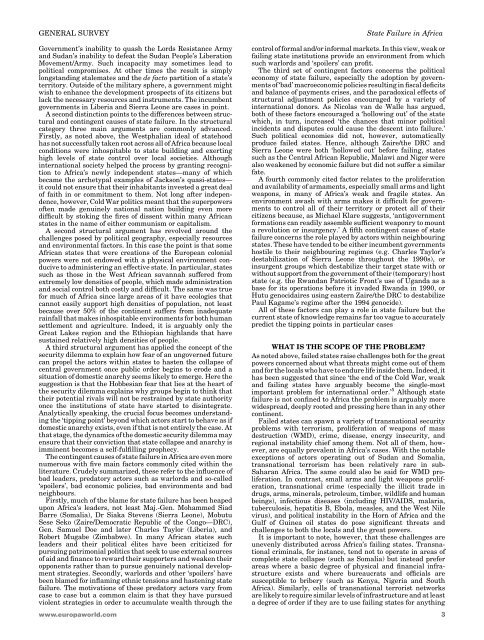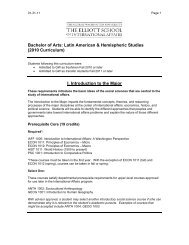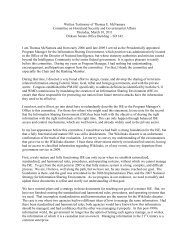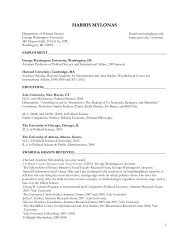state failure in africa: causes, consequences and responses
state failure in africa: causes, consequences and responses
state failure in africa: causes, consequences and responses
You also want an ePaper? Increase the reach of your titles
YUMPU automatically turns print PDFs into web optimized ePapers that Google loves.
GENERAL SURVEY State Failure <strong>in</strong> Africa<br />
Government’s <strong>in</strong>ability to quash the Lords Resistance Army<br />
<strong>and</strong> Sudan’s <strong>in</strong>ability to defeat the Sudan People’s Liberation<br />
Movement/Army. Such <strong>in</strong>capacity may sometimes lead to<br />
political compromises. At other times the result is simply<br />
longst<strong>and</strong><strong>in</strong>g stalemates <strong>and</strong> the de facto partition of a <strong>state</strong>’s<br />
territory. Outside of the military sphere, a government might<br />
wish to enhance the development prospects of its citizens but<br />
lack the necessary resources <strong>and</strong> <strong>in</strong>struments. The <strong>in</strong>cumbent<br />
governments <strong>in</strong> Liberia <strong>and</strong> Sierra Leone are cases <strong>in</strong> po<strong>in</strong>t.<br />
A second dist<strong>in</strong>ction po<strong>in</strong>ts to the differences between structural<br />
<strong>and</strong> cont<strong>in</strong>gent <strong>causes</strong> of <strong>state</strong> <strong>failure</strong>. In the structural<br />
category three ma<strong>in</strong> arguments are commonly advanced.<br />
Firstly, as noted above, the Westphalian ideal of <strong>state</strong>hood<br />
has not successfully taken root across all of Africa because local<br />
conditions were <strong>in</strong>hospitable to <strong>state</strong> build<strong>in</strong>g <strong>and</strong> exert<strong>in</strong>g<br />
high levels of <strong>state</strong> control over local societies. Although<br />
<strong>in</strong>ternational society helped the process by grant<strong>in</strong>g recognition<br />
to Africa’s newly <strong>in</strong>dependent <strong>state</strong>s—many of which<br />
became the archetypal examples of Jackson’s quasi-<strong>state</strong>s—<br />
it could not ensure that their <strong>in</strong>habitants <strong>in</strong>vested a great deal<br />
of faith <strong>in</strong> or commitment to them. Not long after <strong>in</strong>dependence,<br />
however, Cold War politics meant that the superpowers<br />
often made genu<strong>in</strong>ely national nation build<strong>in</strong>g even more<br />
difficult by stok<strong>in</strong>g the fires of dissent with<strong>in</strong> many African<br />
<strong>state</strong>s <strong>in</strong> the name of either communism or capitalism.<br />
A second structural argument has revolved around the<br />
challenges posed by political geography, especially resources<br />
<strong>and</strong> environmental factors. In this case the po<strong>in</strong>t is that some<br />
African <strong>state</strong>s that were creations of the European colonial<br />
powers were not endowed with a physical environment conducive<br />
to adm<strong>in</strong>ister<strong>in</strong>g an effective <strong>state</strong>. In particular, <strong>state</strong>s<br />
such as those <strong>in</strong> the West African savannah suffered from<br />
extremely low densities of people, which made adm<strong>in</strong>istration<br />
<strong>and</strong> social control both costly <strong>and</strong> difficult. The same was true<br />
for much of Africa s<strong>in</strong>ce large areas of it have ecologies that<br />
cannot easily support high densities of population, not least<br />
because over 50% of the cont<strong>in</strong>ent suffers from <strong>in</strong>adequate<br />
ra<strong>in</strong>fall that makes <strong>in</strong>hospitable environments for both human<br />
settlement <strong>and</strong> agriculture. Indeed, it is arguably only the<br />
Great Lakes region <strong>and</strong> the Ethiopian highl<strong>and</strong>s that have<br />
susta<strong>in</strong>ed relatively high densities of people.<br />
A third structural argument has applied the concept of the<br />
security dilemma to expla<strong>in</strong> how fear of an ungoverned future<br />
can propel the actors with<strong>in</strong> <strong>state</strong>s to hasten the collapse of<br />
central government once public order beg<strong>in</strong>s to erode <strong>and</strong> a<br />
situation of domestic anarchy seems likely to emerge. Here the<br />
suggestion is that the Hobbesian fear that lies at the heart of<br />
the security dilemma expla<strong>in</strong>s why groups beg<strong>in</strong> to th<strong>in</strong>k that<br />
their potential rivals will not be restra<strong>in</strong>ed by <strong>state</strong> authority<br />
once the <strong>in</strong>stitutions of <strong>state</strong> have started to dis<strong>in</strong>tegrate.<br />
Analytically speak<strong>in</strong>g, the crucial focus becomes underst<strong>and</strong><strong>in</strong>g<br />
the ‘tipp<strong>in</strong>g po<strong>in</strong>t’ beyond which actors start to behave as if<br />
domestic anarchy exists, even if that is not entirely the case. At<br />
that stage, the dynamics of the domestic security dilemma may<br />
ensure that their conviction that <strong>state</strong> collapse <strong>and</strong> anarchy is<br />
imm<strong>in</strong>ent becomes a self-fulfill<strong>in</strong>g prophecy.<br />
The cont<strong>in</strong>gent <strong>causes</strong> of <strong>state</strong> <strong>failure</strong> <strong>in</strong> Africa are even more<br />
numerous with five ma<strong>in</strong> factors commonly cited with<strong>in</strong> the<br />
literature. Crudely summarized, these refer to the <strong>in</strong>fluence of<br />
bad leaders, predatory actors such as warlords <strong>and</strong> so-called<br />
‘spoilers’, bad economic policies, bad environments <strong>and</strong> bad<br />
neighbours.<br />
Firstly, much of the blame for <strong>state</strong> <strong>failure</strong> has been heaped<br />
upon Africa’s leaders, not least Maj.-Gen. Mohammed Siad<br />
Barre (Somalia), Dr Siaka Stevens (Sierra Leone), Mobutu<br />
Sese Seko (Zaire/Democratic Republic of the Congo—DRC),<br />
Gen. Samuel Doe <strong>and</strong> later Charles Taylor (Liberia), <strong>and</strong><br />
Robert Mugabe (Zimbabwe). In many African <strong>state</strong>s such<br />
leaders <strong>and</strong> their political élites have been criticized for<br />
pursu<strong>in</strong>g patrimonial politics that seek to use external sources<br />
of aid <strong>and</strong> f<strong>in</strong>ance to reward their supporters <strong>and</strong> weaken their<br />
opponents rather than to pursue genu<strong>in</strong>ely national development<br />
strategies. Secondly, warlords <strong>and</strong> other ‘spoilers’ have<br />
been blamed for <strong>in</strong>flam<strong>in</strong>g ethnic tensions <strong>and</strong> hasten<strong>in</strong>g <strong>state</strong><br />
<strong>failure</strong>. The motivations of these predatory actors vary from<br />
case to case but a common claim is that they have pursued<br />
violent strategies <strong>in</strong> order to accumulate wealth through the<br />
control of formal <strong>and</strong>/or <strong>in</strong>formal markets. In this view, weak or<br />
fail<strong>in</strong>g <strong>state</strong> <strong>in</strong>stitutions provide an environment from which<br />
such warlords <strong>and</strong> ‘spoilers’ can profit.<br />
The third set of cont<strong>in</strong>gent factors concerns the political<br />
economy of <strong>state</strong> <strong>failure</strong>, especially the adoption by governments<br />
of ‘bad’ macroeconomic policies result<strong>in</strong>g <strong>in</strong> fiscal deficits<br />
<strong>and</strong> balance of payments crises, <strong>and</strong> the paradoxical effects of<br />
structural adjustment policies encouraged by a variety of<br />
<strong>in</strong>ternational donors. As Nicolas van de Walle has argued,<br />
both of these factors encouraged a ‘hollow<strong>in</strong>g out’ of the <strong>state</strong><br />
which, <strong>in</strong> turn, <strong>in</strong>creased ‘the chances that m<strong>in</strong>or political<br />
<strong>in</strong>cidents <strong>and</strong> disputes could cause the descent <strong>in</strong>to <strong>failure</strong>.’<br />
Such political economies did not, however, automatically<br />
produce failed <strong>state</strong>s. Hence, although Zaire/the DRC <strong>and</strong><br />
Sierra Leone were both ‘hollowed out’ before fail<strong>in</strong>g, <strong>state</strong>s<br />
such as the Central African Republic, Malawi <strong>and</strong> Niger were<br />
also weakened by economic <strong>failure</strong> but did not suffer a similar<br />
fate.<br />
A fourth commonly cited factor relates to the proliferation<br />
<strong>and</strong> availability of armaments, especially small arms <strong>and</strong> light<br />
weapons, <strong>in</strong> many of Africa’s weak <strong>and</strong> fragile <strong>state</strong>s. An<br />
environment awash with arms makes it difficult for governments<br />
to control all of their territory or protect all of their<br />
citizens because, as Michael Klare suggests, ‘antigovernment<br />
formations can readily assemble sufficient weaponry to mount<br />
a revolution or <strong>in</strong>surgency.’ A fifth cont<strong>in</strong>gent cause of <strong>state</strong><br />
<strong>failure</strong> concerns the role played by actors with<strong>in</strong> neighbour<strong>in</strong>g<br />
<strong>state</strong>s. These have tended to be either <strong>in</strong>cumbent governments<br />
hostile to their neighbour<strong>in</strong>g regimes (e.g. Charles Taylor’s<br />
destabilization of Sierra Leone throughout the 1990s), or<br />
<strong>in</strong>surgent groups which destabilize their target <strong>state</strong> with or<br />
without support from the government of their (temporary) host<br />
<strong>state</strong> (e.g. the Rw<strong>and</strong>an Patriotic Front’s use of Ug<strong>and</strong>a as a<br />
base for its operations before it <strong>in</strong>vaded Rw<strong>and</strong>a <strong>in</strong> 1990, or<br />
Hutu genocidaires us<strong>in</strong>g eastern Zaire/the DRC to destabilize<br />
Paul Kagame’s regime after the 1994 genocide).<br />
All of these factors can play a role <strong>in</strong> <strong>state</strong> <strong>failure</strong> but the<br />
current <strong>state</strong> of knowledge rema<strong>in</strong>s far too vague to accurately<br />
predict the tipp<strong>in</strong>g po<strong>in</strong>ts <strong>in</strong> particular cases<br />
WHAT IS THE SCOPE OF THE PROBLEM?<br />
As noted above, failed <strong>state</strong>s raise challenges both for the great<br />
powers concerned about what threats might come out of them<br />
<strong>and</strong> for the locals who have to endure life <strong>in</strong>side them. Indeed, it<br />
has been suggested that s<strong>in</strong>ce ‘the end of the Cold War, weak<br />
<strong>and</strong> fail<strong>in</strong>g <strong>state</strong>s have arguably become the s<strong>in</strong>gle-most<br />
important problem for <strong>in</strong>ternational order.’ 5 Although <strong>state</strong><br />
<strong>failure</strong> is not conf<strong>in</strong>ed to Africa the problem is arguably more<br />
widespread, deeply rooted <strong>and</strong> press<strong>in</strong>g here than <strong>in</strong> any other<br />
cont<strong>in</strong>ent.<br />
Failed <strong>state</strong>s can spawn a variety of transnational security<br />
problems with terrorism, proliferation of weapons of mass<br />
destruction (WMD), crime, disease, energy <strong>in</strong>security, <strong>and</strong><br />
regional <strong>in</strong>stability chief among them. Not all of them, however,<br />
are equally prevalent <strong>in</strong> Africa’s cases. With the notable<br />
exceptions of actors operat<strong>in</strong>g out of Sudan <strong>and</strong> Somalia,<br />
transnational terrorism has been relatively rare <strong>in</strong> sub-<br />
Saharan Africa. The same could also be said for WMD proliferation.<br />
In contrast, small arms <strong>and</strong> light weapons proliferation,<br />
transnational crime (especially the illicit trade <strong>in</strong><br />
drugs, arms, m<strong>in</strong>erals, petroleum, timber, wildlife <strong>and</strong> human<br />
be<strong>in</strong>gs), <strong>in</strong>fectious diseases (<strong>in</strong>clud<strong>in</strong>g HIV/AIDS, malaria,<br />
tuberculosis, hepatitis B, Ebola, measles, <strong>and</strong> the West Nile<br />
virus), <strong>and</strong> political <strong>in</strong>stability <strong>in</strong> the Horn of Africa <strong>and</strong> the<br />
Gulf of Gu<strong>in</strong>ea oil <strong>state</strong>s do pose significant threats <strong>and</strong><br />
challenges to both the locals <strong>and</strong> the great powers.<br />
It is important to note, however, that these challenges are<br />
unevenly distributed across Africa’s fail<strong>in</strong>g <strong>state</strong>s. Transnational<br />
crim<strong>in</strong>als, for <strong>in</strong>stance, tend not to operate <strong>in</strong> areas of<br />
complete <strong>state</strong> collapse (such as Somalia) but <strong>in</strong>stead prefer<br />
areas where a basic degree of physical <strong>and</strong> f<strong>in</strong>ancial <strong>in</strong>frastructure<br />
exists <strong>and</strong> where bureaucrats <strong>and</strong> officials are<br />
susceptible to bribery (such as Kenya, Nigeria <strong>and</strong> South<br />
Africa). Similarly, cells of transnational terrorist networks<br />
are likely to require similar levels of <strong>in</strong>frastructure <strong>and</strong> at least<br />
a degree of order if they are to use fail<strong>in</strong>g <strong>state</strong>s for anyth<strong>in</strong>g<br />
www.europaworld.com 3
















